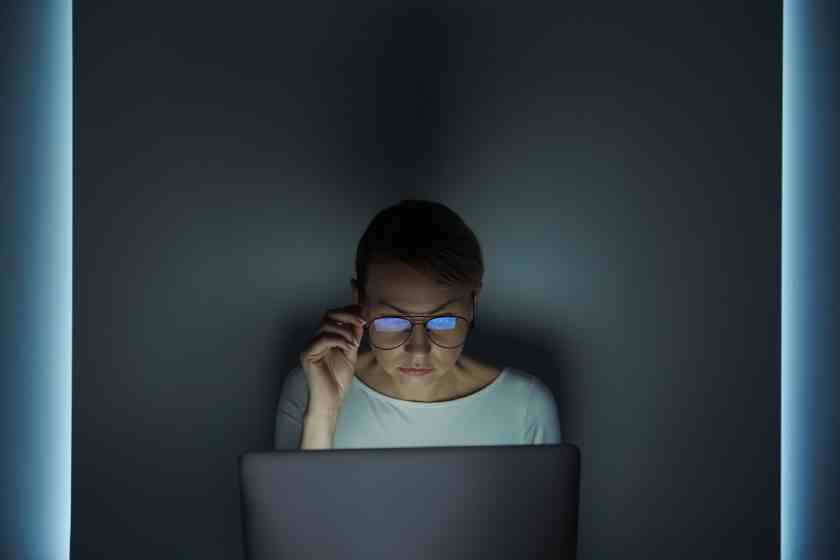Have you ever wondered why it is advised to limit your screen time? In today’s digital world, we are glued to our screens more than we would like. Whether it’s scrolling reels on our phones, working on our laptops, or watching shows on the TV, we always end up staring at a screen.
This may result in vision health problems that may require a degree of special eye care and treatments. Of course, for us, it’s about getting the work done and enjoying it a little bit. But do you know that these devices subtly give you something else as well? The blue light which is a high-energy visible light.
While blue light isn’t inherently bad—natural blue light from the sun helps regulate our sleep and wake cycles—prolonged exposure to artificial blue light can impact our eyes and overall health. Let’s see how.
What is the Blue Light?
The sun is the largest source of blue light. Put simply, it is the part of the visible light spectrum that is made of different colors, each with a different wavelength. Blue light, specifically, has a short wavelength. This means that it produces a high amount of energy.
Natural blue light from the sun helps to regulate our circadian rhythm—the body’s natural sleep-wake cycle. Moreover, it makes you alert, improves your memory and cognitive functions, and elevates your mood.
Our digital devices are the most common artificial source of this light. Hmm..maybe that’s why you have trouble falling asleep after you have used your phone. There’s more to what blue light from devices can do to your eyes. Let’s see.
Also Read – 5 Eye Health Tips Essential for Optimal Vision
The Risks of Blue Light Exposure
Blue light is hard for your eyes to block. This means that nearly all of the blue light travels to your retina and this may be a cause for concern. Take a look!
1. Digital Strain
Computer vision syndrome or digital strain is the result of prolonged screen time. You know when your eyes start to feel dry, and your vision starts to get a little blurry? That’s digital strain knocking on your eyes! Furthermore, it causes headaches and aches in your shoulder and neck. But why exactly does this happen?
Well, that’s because blue light scatters more easily, making it challenging for your eyes to focus. This unfocused visual “noise” reduces contrast and contributes to digital eye strain.
2. Disrupted Sleep Patterns
Blue light also affects the production of melatonin, the hormone that regulates sleep. As a result, you are unable to go to bed and wake up fresh the next morning. Think of all the moments you were lying in your bed, scrolling on your phone, and trying to sleep but just couldn’t catch Zzz.
3. Long-Term Damage
October 2020 research on blue light suggests that blue light can cause irreversible photochemical damage to our eyes. So much that it can cause oxidative stress and DNA damage.
It has an impact on your cornea, lens, and retina, causing temporary or permanent damage. In fact, it can speed up the chances of developing age-related macular degeneration (AMD). Although more research is needed to conclude, it is best to take preventive care.
Also Read – 5 Common Eye Conditions: Causes, Symptoms, and Treatments
4. Role of Diet
In humans, macular pigments, made up of lutein and zeaxanthin, naturally protect the eyes by filtering blue light. Research says that you can boost these pigments by consuming more foods rich in these nutrients or by taking supplements.
Moreover, increased intake is linked to a lower risk of age-related macular degeneration (AMD) and cataracts. Additionally, antioxidants like vitamins C and E, as well as zinc, may help prevent photochemical damage to the eyes by reducing oxidative stress.
Taking Care of Your Eyes
Protecting your eyes from blue light is easier than you may think. For starters, follow the 20-20-20 rule—every 20 minutes, take a 20-second break and look at something 20 feet away. This will give your eye muscles a break from the screen and reduce the strain.
Additionally, adjust your device settings to reduce the emission of blue light. For instance, the night mode. If you spend long hours in front of the screen, then it is best you invest in a pair of blue light-blocking glasses.
That’s a wrap. You have been staring at the screen for quite some time now—come on, take a quick walk, stretch, and give yourself some rest!
If you are looking for an eye specialist in Mumbai, contact Shree Ramkrishna Netralaya.

